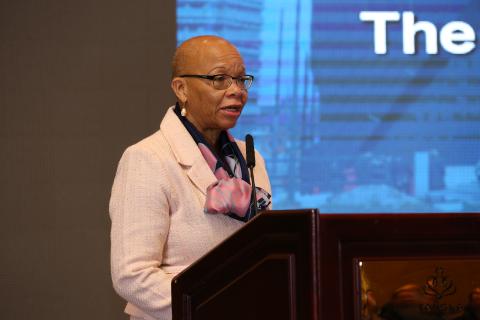WMU President Addresses ISO/TC8 Plenary Meeting in Beijing on Maritime Education and Training

The WMU President, Dr. Cleopatra Doumbia-Henry, addressed the 35th Session of the International Standards Organization (ISO) Committee, TC/8 Ships and Marine Technology on 27 September and delivered a keynote speech on the theme “Seafarer Protection in the Context of International Maritime Law: The Role of Maritime Education and Training”. She highlighted the following issues: the significance of STCW as the up to date standard; the implication of Goal 4 of the UN Sustainable Development Goals (SDGs) for maritime education and training; the global attention that needs to be focussed on MET and its need to be responsive to the changing global environment; the importance of enhanced quality maritime standards systems; the need to broaden the scope of MET; and the approach to education and training to include lifelong learning.
Dr. Doumbia-Henry referred to the importance of enhanced quality maritime standards systems, and noted the significant contribution that ISO has made in this regard, with many countries choosing to use the ISO Quality Model 9000 Series as their “international model”. President Doumbia-Henry stated that “in view of the specificity of maritime education and the global nature of the shipping industry, which is like no other, it may be timely to consider the possibility to develop some kind of maritime education management common criteria under the ISO umbrella.” She indicated that WMU would be happy to be associated with such an initiative if it were to be considered appropriate.
She also called for a broader approach to education that will help provide employment for seafarers, and by extension support world trade that they facilitate. She added: “It is ultimately in the interest of all parties - and the maritime community as a whole - to ensure that seafarers are educated and trained in accordance with international standards, bearing in mind that the STCW Convention as amended, like all international standards, set minimum standards from which one builds and not a ceiling to which one aspires. The development of human resources also benefits the global maritime community and fosters a paradigm of lifelong learning in accordance with Goal 4 of the UN SDGs – to ensure inclusive and quality education for all and promote lifelong learning.” She affirmed that the maritime industry needed global quality education as much as the rest of the world needed the industry and that together, with a well-educated and trained human resource all across the spectrum of the industry, we can ensure safe, secure, efficient and sustainable shipping on clean oceans in line with the IMO Conventions and Goal 14 of the UN SDGs.
The IMO Secretary-General, Mr Kitack Lim, also addressed the Plenary Session as a Keynote speaker on the theme “IMO and ISO – collaborating on technical standards for shipping”. More than 70 delegates attended the 35th Session of ISO/TC8 Plenary.
